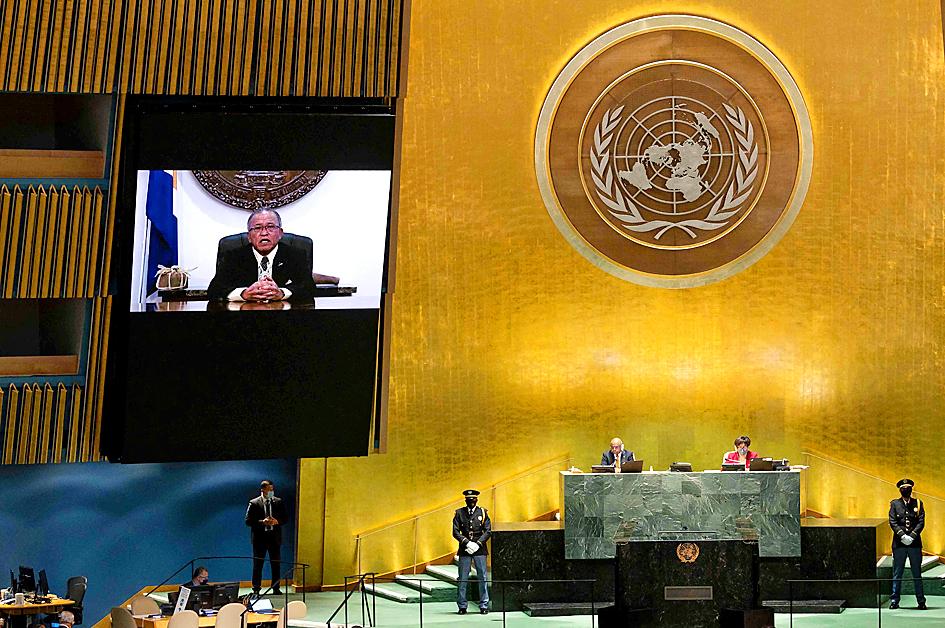Marshall Islands President David Kabua on Wednesday urged the UN to put an end to the “shameful silence” on Taiwan’s exclusion from the UN system.
In his 15-minute pre-recorded address to the UN General Assembly in New York City, Kabua said that collective action is needed from all countries, stakeholders and people to ensure a resilient recovery from the COVID-19 pandemic.
“The democratic government of Taiwan should be allowed to participate in an equal and dignified manner within the UN system,” Kabua said, adding that this would include the WHO, the International Civil Aviation Organization, the UN Framework Convention on Climate Change and the UN’s Sustainable Development Goals.

Photo: AFP
The UN has repeatedly cited General Assembly Resolution 2758 to prevent Taiwan’s inclusion, he said.
“There is absolutely nothing in General Assembly Resolution 2758 which prevents this inclusive approach, and this resolution affords nothing to hide behind, as it expresses no position on Taiwan,” he said.
“As a people-centric institution, the UN cannot ignore the Taiwanese people or continue to use their nationality to exclude them from attending public meetings or public tours at its headquarters. The shameful silence must end,” Kabua said.
The resolution — passed on Oct. 25, 1971 — says that the People’s Republic of China is the only legitimate representative of China to the UN, instead of the Republic of China, Taiwan’s official name.
Taipei has over the past few years reiterated its position that the resolution is concerned with the representation of China, not Taiwan, and that it does not describe Taiwan as part of China, nor does it authorize Beijing to represent Taiwan in the UN system.
Guatemalan President Alejandro Giammattei Falla briefly mentioned Taiwan in his address to the General Assembly.
Guatemala believes that Taiwan can provide “experience, capacities and knowledge” to boost multilateralism at a time when the world is facing challenges, he said.
Honduran President Juan Orlando Hernandez, the third leader of an ally of Taiwan to speak in front of the UN on that day, did not mention Taiwan in his address, marking the sixth consecutive year that the Central American ally did not speak up on behalf of the nation at the General Assembly.
Instead, Honduras sends a letter to the UN secretary-general each year to support Taiwan’s participation in the UN system.
Nauru, an ally of Taiwan in the Pacific, was expected to speak yesterday after press time.
Taiwan left the UN in 1971, and Beijing took its place.
Since then, the nation has been excluded from the General Assembly and other UN agencies.

A car bomb killed a senior Russian general in southern Moscow yesterday morning, the latest high-profile army figure to be blown up in a blast that came just hours after Russian and Ukrainian delegates held separate talks in Miami on a plan to end the war. Kyiv has not commented on the incident, but Russian investigators said they were probing whether the blast was “linked” to “Ukrainian special forces.” The attack was similar to other assassinations of generals and pro-war figures that have either been claimed, or are widely believed to have been orchestrated, by Ukraine. Russian Lieutenant General Fanil Sarvarov, 56, head

SAFETY FIRST: Double the number of police were deployed at the Taipei Marathon, while other cities released plans to bolster public event safety Authorities across Taiwan have stepped up security measures ahead of Christmas and New Year events, following a knife and smoke bomb attack in Taipei on Friday that left four people dead and 11 injured. In a bid to prevent potential copycat incidents, police deployments have been expanded for large gatherings, transport hubs, and other crowded public spaces, according to official statements from police and city authorities. Taipei Mayor Chiang Wan-an (蔣萬安) said the city has “comprehensively raised security readiness” in crowded areas, increased police deployments with armed officers, and intensified patrols during weekends and nighttime hours. For large-scale events, security checkpoints and explosives

A magnitude 7.0 earthquake struck off Yilan at 11:05pm yesterday, the Central Weather Administration (CWA) said. The epicenter was located at sea, about 32.3km east of Yilan County Hall, at a depth of 72.8km, CWA data showed There were no immediate reports of damage. The intensity of the quake, which gauges the actual effect of a seismic event, measured 4 in Yilan County area on Taiwan’s seven-tier intensity scale, the data showed. It measured 4 in other parts of eastern, northern and central Taiwan as well as Tainan, and 3 in Kaohsiung and Pingtung County, and 2 in Lienchiang and Penghu counties and 1

‘POLITICAL GAME’: DPP lawmakers said the motion would not meet the legislative threshold needed, and accused the KMT and the TPP of trivializing the Constitution The Legislative Yuan yesterday approved a motion to initiate impeachment proceedings against President William Lai (賴清德), saying he had undermined Taiwan’s constitutional order and democracy. The motion was approved 61-50 by lawmakers from the main opposition Chinese Nationalist Party (KMT) and the smaller Taiwan People’s Party (TPP), who together hold a legislative majority. Under the motion, a roll call vote for impeachment would be held on May 19 next year, after various hearings are held and Lai is given the chance to defend himself. The move came after Lai on Monday last week did not promulgate an amendment passed by the legislature that